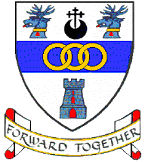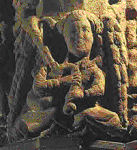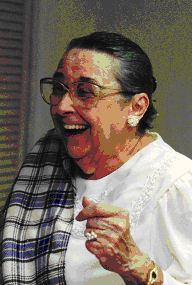
Per ardua ad alta
 Clan
Hannay News Clan
Hannay News
Spring/Summer 2005
A Message from the Convener
Happy New Year! Hope it’s started off well for you and yours.
It’s been pretty wet at my
house in Southern California, and on that note, I’d like to offer a prayer
for our Scots friends who have had to endure, well, Scottish weather.
The big change for Clan
Hannay Society West is the retirement of Noreen Hanna, who has been a
cheerful and diligent membership secretary for several years. She wanted
to retire a few years ago, but graciously agreed to stay on until we could
find a replacement.
I am pleased to
announce—I’m sure no more pleased than Noreen is—that Michele Thompson, of
Washington, has agreed to step up and take over those duties. So here’s a
big thank you to Noreen for all the hard work, along with the hope that
this doesn’t mean we won’t see her at some of the Gatherings in the
summer.
Michele will be responsible
for keeping the mailing list up to date, sending out the annual reminders
for membership dues, and forwarding a portion of our annual dues to the
international Clan Hannay Society. For a brief biography of her, please
see below.
I’m especially pleased
about Michele’s participation because one of the main topics of discussion
at the general membership meeting in Monterey was the need to attract
younger people into the Clan, and for them to begin taking leadership
positions.
So many of the people who
have been stalwart supporters of CHSW have been active for two decades or
longer, and are ready to pass on the mantle. The hope is younger faces
will draw in younger people and the branch will continue to grow. So, if
you have any desire to take a greater role in CHSW, please let me know, or
if you have any ideas about what we can do as a branch to make it more
meaningful to you or to those in your family, please pass along your
suggestions.
On that topic, I want to
appeal to those of you who haven’t attended a Highland Games and Gathering
recently to check out what’s on the schedule near you (see page 7), and
plan to attend. If you have a few hours to volunteer in the Clan Hannay
tent, let me know and we’ll get you some literature and other support.
Those of you who have been
around CHSW for a while probably met my mother, Lorna Hanna. I’m sad to
report that she died in December.
An Englishwoman by
heritage, she had an ongoing, lighthearted dispute with my father about
the superiority of the English vs. the Scots, but nevertheless proudly
wore the Hannay tartan because it meant so much to her husband and
daughter. (She did famously put her foot down, however, on letting him use
family finances to pay for his kilt, leading him to dig through the trash
at every rest stop along Interstate 5 for months to collect enough soda
and beer cans to earn the cash to pay for it.)
I hope you enjoy this
issue, and if you have anything to contribute, please send it along. We’d
like to hear about your experiences at Gatherings and Games, your travels
in Scotland, family history/pictures, or suggestions for articles you’d
like to see in our newsletter. Please include any photos or artwork you
might have (send a SASE and we’ll return your photos/artwork).
Send to Lora Cline, 2564 N.
Calle Tercero, Huachuca City, AZ 85616, or email her at:
lcnobilus@wmconnect.com
Cheers!
Gigi Hanna
Clan Hannay Society West
welcomes new secretary
Michele Thompson hails from
Walla Walla, Washington. In 1991 she graduated from Junipero Serra High
School in San Diego. Back in Washington, Michele attended South Puget
Sound Community College for two years, then moved to Ellensberg to study
anthropology for a year, then back to Olympia to finish her associate’s
degree in 2000.
It was during this time she
became involved in several of her clans. Michele is related to Clan
Donnachaidh (Robertson) through a great, great, great grandmother; Clan Mc
Tavish/Thom(p)son through birth; Clan Maxwell through a grandmother; and
Clan Hannay through a great grandmother.
For several months during
2001 she was Washington State Commissioner for McTavish/Thom(p)son, then
became State Commissioner for Clan Hannay in 2002.
She travelled to Scotland
in 1999 and visited Sorbie, Dumphries, Galloway, and her Maxwell ancestral
home of Caerlaverock.
Michele has one younger
sister, and she is the aunt of her sister’s girls. Her hobbies are cross
stitch, genealogy, writing and farming. She says the farming is “confined
to an apartment flower bed,” but she hopes to have a farm some day.
Bagpipes: An ancient tradition
Scotland has a wealth and variety of music, and one of the oldest and
most successful of wind instruments is the Bagpipe.
 Although
its origins have never been the property of one people or nation, it is
now strongly identified with Scotland, especially in the form of the Great
Highland Bagpipe. Although
its origins have never been the property of one people or nation, it is
now strongly identified with Scotland, especially in the form of the Great
Highland Bagpipe.
The Scottish or Highland
pipe is now the best known in the world, with one bass drone harmonising
with two tenor drones and being tuned to the pitch of the pipe chanter.
This powerful instrument
has a long pedigree deriving from prehistoric shawms and hornpipes of Near
Eastern civilisations, evolving with bag and drones in Classical and early
European history, and emerging as a familiar instrument by the 12th
century, significantly a renaissance period of economic well-being.
The pipes were being played
in Scotland by the 14th century and in the Highlands by about 1400. They
achieved their recognisable form in the late 16th and 17th centuries, with
decorated chanter and drones, when they also overtook the harp as the
musical instrument of Gaelic society and assumed a traditional role in
Gaelic culture; they complemented the bardic tradition of brosnachadh -
encouragement and incitement - the praise of warriors and chieftains and
the lament for their passing. They were played in the Great Hall and
naturally for dancing and entertainment.
Dynasties of pipers
emerged, such as MacCrimmons, MacKays, MacGregors, and Cummings, who
performed the duties of official piper for their patrons through
successive generations and who sustained and generated the music of the
bagpipe until the collapse of the society which nurtured them in the wake
of the Jacobite wars of the 18th century.
The Highland bagpipe
survived by virtue of the growth of the empire and standing armies and
these influences standardised the instrument and styles of playing. Piping
both in Scotland and in Europe as a whole had been characterised by
variety of music and playing styles, and of the instrument itself. Other
forms of bagpipe that are gaining increasing popularity are the Scottish
Small Pipes and the Border Pipes.
The Scottish Small Pipe
produces a mellow sound. Small pipes are played across the knees with the
use of a bellows. No blowing at all is required. The border pipes are
operated by the same means, but they produce a sound more akin to that of
the Highland Bagpipe. These types of Bagpipe are suited to being played
with other instruments such as fiddles and whistle. This is because they
are most commonly played in the key of A or D as opposed to B-flat of the
Highland Bagpipe. [by Hugh Cheape, National Museum of Scotland]
A brief history of Highland games
 When
celebrating in times of peace one of the Highlanders’ favorite pastimes
was the tainchel. For these “great hunts” very often several clans would
combine. Chieftains would send word to the clansmen that such an event was
planned and when and where they should assemble. When
celebrating in times of peace one of the Highlanders’ favorite pastimes
was the tainchel. For these “great hunts” very often several clans would
combine. Chieftains would send word to the clansmen that such an event was
planned and when and where they should assemble.
For several days the
greater part of the clansmen assembled would go out into the mountains and
begin driving the red deer and other animals in front of them in a
gradually tightening circle. Soon the animals were driven off the
mountains and through the passes where the waiting armed huntsmen would
make the kills. After such a successful hunt a great feast and celebration
would be held and venison would be sent to everyone who was unable to
attend.
Then the rival clansmen
would relax by testing each other’s prowess at various sports, such as
running, jumping, wrestling, or primitive forms of weight putting with
stones, or divided into roughly equal sides vying against each other in a
very early form of camanachd or shinty.
Lastly the clansmen would
vie with each other in piping and in dancing, the pipers taking it in
turns to demonstrate their skills and the clansmen to demonstrate their
agility and neatness of movement by dancing complicated steps to the pipe
music.
These relaxations were in
effect the forerunners of the modern Highland games. From the very
earliest times Chieftains would arrange races among their followers to
find the fastest man available for carrying urgent messages in time of war
or clan battles.
Legend has it that Malcolm
Canmore (1057-1093) organized one of the first races run for this purpose.
It is said he offered a purse of gold and a fine sword, plus the post
itself, to the first runner to make it to the top of Craig Choinich, one
of the mountains above Braemar, and return to the starting point. [from
“The Essential Guide to Highland Games,” by Michael Brander]
About bagpipes...
I understand the inventor of the
bagpipes was inspired when he saw a man carrying an indignant, asthmatic
pig under his arm. Unfortunately, the manmade sound never equalled the
purity of the sound achieved by the pig.
— Alfred Hitchcock
And about golf...
Sign at a Scottish golf course: “Members will refrain from picking up lost
balls until they have stopped rolling.”
A Scotsman was playing golf with a church elder. On the last hole the
Scotsman missed a six-inch putt which cost him the match but, out of
deference to his playing partner’s status, he said absolutely nothing.
“That,” said the elder, “was the most profane silence I have ever heard.”
Why are Scotsmen so good at golf? They realize that the fewer times they
hit the ball the longer it will last. [see more of these wee tidbits at
ElectricScotland.com “humor.”]
Highland Games
ARIZONA
Prescott Highland Games
May 21 ~ Watson Lake Park ~ Prescott, AZ
(928) 771-1218
Arizona Highlands Celtic Festival
July 16 ~ Foxglen Park, Flagstaff, AZ ~ (928) 556-3161
CALIFORNIA
Angels Camp Calaveras Celtic Faire
March 12-13 ~ Calaveras County Fairgrounds, CA
www.calaverascelticfaire.com
Kern County Scottish Society’s Annual Scottish Gathering & Games
April 2 ~ Stramler Park, Bakersfield, CA
Fremont Tartan Day
April 6 ~ Ardenwood Historic Farm, Fremont, CA
Sacramento Valley Scottish Games & Gathering
April 22-24 ~ Yolo County Fairgrounds, Woodland, CA
Livermore Scottish Games & Celtic Festival
May 14-15 ~ Robertson Park, Livermore, CA
manager1@livermoregames.com
United Scottish Society of Southern California Scottish Festival
May 28-29 ~ Los Angeles Fairplex, Pomona, CA
Modesto Highland Games
June 4 ~ Modesto, CA ~ (209) 538-0821
Campbell Highland Games & Celtic Gathering
June 18 ~ Campbell, CA ~ scotnono1@aol.com
San Diego Scottish Highland Games & Gathering of the Clans
June 25-26 ~ Vista, CA ~ sdshgchief@earthlink.net
Oakland Dunsmuir Highland Games
July 9-10 ~ Oakland, CA ~ www.dunsmuir.org/scots
Monterey Scottish Festival Highland Games
August 6-7 ~ Salinas, CA ~ www.MontereyScotGames.com
Pleasanton Scottish Highland Gathering & Games
September 3-4 ~ Alameda County Fairgrounds, Pleasanton, CA
www.caledonian.org
Fresno Scottish Festival & Highland Games
September 17 ~ Madera, CA ~ www.scottishsociety.org
Dixon Scottish Highland Games
September 24 ~ Dixon May Fairgrounds, Dixon, CA
www.dixonscots.org (707) 678-8814
Loch Lomond Highland Games
October 2 ~ Highlands Park, Ben Lomond, CA
www.lochlomondceltic.org
Seaside Highland Games
October 7-9 ~ Seaside Park, Ventura, CA
www.seaside-games.com
OREGON
Oregon Scottish Heritage Festival
April 9 ~ Lin County Fair & Expo, Salem, OR ~ www.oregonscottish.org
Klamath Basin Scottish Games & Festival
June 18 ~ Running Y Ranch Resort, Klamath Falls, OR ~ (541) 883-1601
Athena Caledonian Games
July 9-11 ~ City Park, High School Grounds, Athena, OR
www.athenacaledoniangames.org
Portland Scottish Highland Games
July 16 ~ Mount Hood Community College, Gresham, OR ~ www.phga.org
High Desert Celtic Festival & Highland Games
August 13 ~ J Bar J Boy’s Ranch, Bend, OR ~ www.hdcs.net/festival.htm
Douglas County Celtic Highland Games
August 13-15 ~ City Park, Winston, OR ~ (541) 673-7463
Sweet Home Celtic Festival & Highland Games
August 20-22 ~ Sweet Home, OR
WASHINGTON
Washington State National Tartan Day
April 6 ~ Western Washington Fairgrounds, Puyallup, WA
tartandaywashington.org
Tri-Cities Scottish Highland Games
May 7 ~ Columbia Park, Kennewick, WA ~ sunland@3-cities.com
Bellingham/Whatcom County Highland Games
June 4 ~ Ferndale, WA ~ www.bellinghamhighland.org
Prosser Scottish Fest
June 18-19 ~ Prosser, WA
www.prosserchamber.org/scottish_games.htm
Tacoma Highland Games
June 25 ~ Graham, WA ~ (206) 939-8413
Fort Vancouver Caledonian Gathering, Games, Fair, Festival
July 2 ~ Lark County Fairgrounds, Ridgefield, WA ~ www.swsha.org
Skagit Valley Highland Games & Scottish Faire
July 9-10 ~ Edgewater Park, Mount Vernon, WA ~ (360) 416-4934
Pacific Northwest Scottish Highland Games
July 30-31 ~ King County Fairgrounds, Enumclaw, WA
Spokane Highland Games
August 6 ~ Spokane Countgy Fair & Expo Center, Spokane, WA
www.spokanescots.org
Whidbey Island Highland Games
August 13 ~ Greenbank, WA ~ (360) 331-5437
Olympia Scottish Games Festival
August 19 ~ Thurston County Fairgrounds, Olympia, WA
Kelso Scottish Festival & Games
September 9-11 ~ Kelso, WA ~ clandiana@adrlphia.net
 In
Memory In
Memory
Lorna Mary Johnson was born in 1932 in Clark, South Dakota. The oldest of
three children, she married at 16, trained as a nurse and worked with
polio patients.
She was an enthusiastic
volunteer for several groups and once famously survived being hit by a
train while escorting a group of Girls Scouts. No one was seriously
injured, but she dined out on the story for years.
A family move to the Samoan
Islands in the mid-1970s forced her to consolidate her household into
three sea bags. She faced it gracefully and later fondly recalled those
days of living in a thatched-roof hut with no electricity, running water
or walls, showering outside under a cold-water spigot, and fighting off
the occasional nine-inch centipede.
After returning to the U.S., she was transportation coordinator for a
school for blind adults until health problems forced her to retire in
1988. She was a devoted deacon at her church, and was proud to have
brought together leaders from several Christian and Jewish denominations
to launch an inter-faith food bank and social service agency.
She is survived by her
ex-husband, David Hanna, and four children: Jeanne, Scott, Dawn and Gigi,
as well as 11 grandchildren, and 21 great-grandchildren. She was preceded
in death by her son Douglas, who died as an infant. |

